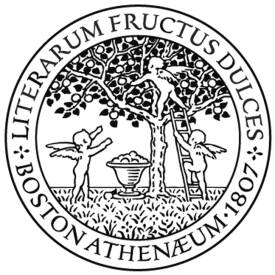Forum Network
Free online lectures: Explore a world of ideas

The Boston Athenaeum, one of the oldest and most distinguished independent libraries in the United States, was founded in 1807 by members of the Anthology Society, a group of fourteen Boston gentlemen who had joined together in 1805 to edit The Monthly Anthology and Boston Review. Their purpose was to form "an establishment similar to that of the Athenaeum and Lyceum of Liverpool in Great Britain; combining the advantages of a public library [and] containing the great works of learning and science in all languages." The library and Art Gallery, established in 1827, were soon flourishing, and grew rapidly, both by purchase of books and art and by frequent gifts. For nearly half a century the Athenaeum was the unchallenged center of intellectual life in Boston, and by 1851 had become one of the five largest libraries in the United States. Today its collections comprise over half a million volumes, with particular strengths in Boston history, New England state and local history, biography, English and American literature, and the fine and decorative arts. The Athenaeum supports a dynamic art gallery, and sponsors a lively variety of events such as lectures and concerts. It also serves as a stimulating center for discussions among scholars, bibliophiles, and a variety of community interest groups.break